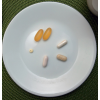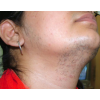What Causes Underactive Thyroid?
admin | September 26, 2015 | បន្ថែមអាហារសុខភាពThe thyroid gland has the central role in regulating our metabolism or the generation and use of energy in the body. A healthy metabolism provides for good neurologic function, muscular and skeletal growth and overall well-being.
When the thyroid falls short of secreting triiodothyronin (T3) and/or thyroxine (T4) (the major thyroid hormones), this indicates the development of the condition called hypothyroidism or underactive thyroid. This condition is most common in women, affecting the middle-age and the elderly.
 What causes underactive thyroid?
What causes underactive thyroid?
Several reasons can cause your thyroids to become underactive. Some can be reversible, while others are often permanent and might need therapy for the rest of their lives.
-
Autoimmune condition
Autoimmune disease indicates a defect in one’s immune system, where it attacks the endocrine system (mainly the thyroid gland). The body perceives the thyroid gland as a foreign body, thus it actively tries to destroy it which causes the thyroid to produce decreased amounts of hormones and to decline in its overall function.
One of the most common hypothyroid condition caused by functional immune system is Hashimoto’s thyroiditis. Often, a goiter or a lump in the neck marks this disease.
-
Congenital or birth defects
In an autoimmune cause, individuals are born with normally functioning thyroid until their immune system decides to harm it. ទោះជាយ៉ាងណា, some persons were born with the disease. This highlights the importance of newborn screening or the collection of blood from the heel of a newborn to determine presence of potentially fatal congenital diseases, one of which is hypothyroidism.
If a baby is born with hypothyroidism, it will cause severe metabolic problems which might affect normal brain functioning and also general health. If not diagnosed immediately, the baby might suffer irreversible brain damage leading to severe mental retardation. Inadequate nutrition may also lead to physical growth retardation.
-
Brain dysfunction
The hypothalamus (commonly known as pituitary gland) is a very small, yet important part of the brain which stimulates thyroid function. A problem in the hypothalamus, due to a disease or trauma, decreases the production of thyroid stimulating hormone (TSH) directly affecting thyroid function as well. The less TSH, the less thyroid functioning. A brain tumor compressing the hypothalamus might cause the thyroid to function ineffectively, thus, removing the tumor is the solution for this case.
-
Iodine deficiency
Iodine is important for thyroid gland, ទោះជាយ៉ាងណា, there are people who lack intake of iodine in their diet predisposing them to underactive thyroid.
Symptoms of underactive thyroid
Since thyroid hormones are responsible for metabolism or how our body uses up the food and energy that we eat, thyroid function can be observed in a person’s general appearance.
People suffering from this condition appear on the hefty side because of underactive thyroid weight gain. Even if they eat a little, they have problems using up the food they eat so they gain weight faster than normal people do.
The ironic thing about people with hypothyroidism is that they cannot tolerate cold temperatures, contrary to normal fat people who cannot stand the heat. ដូចគ្នានេះផងដែរ, underactive thyroid may present with:
-
goiter,
-
slow pulse rate,
-
high blood pressure,
-
frequent constipation,
-
heavier menstruation,
-
rough skin and hair,
-
puffy eyelids, hands and feet,
-
fatigue, និង
-
slower mental function.
Underactive Thyroid Treatment
Standard treatment for this condition centers on thyroid hormone replacement of levothyroxine to be taken daily until condition resolves. Some patients will have to take thyroid supplements permanently to ensure effective metabolism. A blood test must confirm the deficiency of thyroid hormone levels (T4) before replacement therapy.
The tablets are available in 25 mg, 50 mg or 100 mg. normally, the treatment is started on low dosage, then adjusted to higher dose after 3 សប្តាហ៍. After T4 levels have stabilized, puffiness will be resolved, you hair and skin will regain their moisture and sheen and you will lose weight.
Other treatments include supplementation of iodine for those suffering from a deficiency of this mineral.
Underactive Thyroid Diet
Since some thyroid problems are nutritional in etiology, a well thought of diet plan will help resolve the problem. For primary cases, ទោះជាយ៉ាងណា, proper nutrition is important to maintain thyroid function and prevent the condition form getting worse.
Here is a list of food that you should avoid if you are suffering from underactive thyroid:
-
White breads and white flour
This is rich in carbohydrates, making it hard for your body to regulate the levels of insulin. Instead of white, choose less processed flour and bread like wheat. This contains less sugar and more fiber, which your body needs.
-
Caffeine
Caffeine depresses the function of your thyroid, making your condition worse. Make it a point to avoid food and drinks containing caffeine, for it is only coffee that is abundant with this substance. You may have to cut down on your soda and chocolates, even caffeine containing migraine medications to help your thyroid function more effectively.
-
Iodine-blockers
Iodine is good for your thyroid, thus all foods that inhibit the absorption of iodine or decrease its levels should be avoided. Foods and substances that interfere with iodine include:
-
Fluoride – can be found plenty in toothpaste and tap water. Choose dental care products with minimal fluoride content and drink mineral or purified water instead of drinking straight from the faucet.
-
Chlorine – can also be found in water and not just in swimming pools.
-
Garlic – it is good for cardiovascular problems, but a no-no for thyroids. Now, be wary of spaghetti because it contains plenty of garlic.
-
Soy – and all soybean-based products (soy sauce, tofu, soy flour, soy milk, etc.) should be crossed out from your diet.
-
Goitrogenic foods
These are food that induce goiter or the enlargement of the neck and throat area. It is often related to an impairment of thyroid gland. Goitrogenic foods, ironically, include your favorite green, leafy vegetables such as broccoli and cabbage, and also your favorite fruit – peaches. Well, not all vegetables and fruits are good for your health after all. These vegetables and fruits are said to decrease thyroid hormone production and they might also interfere with the effects of thyroid medicine, rendering the treatment ineffective. Keep this in mind because thyroid hormone replacement therapy is a lifetime thing.
Diet for underactive thyroid should be well-balanced. Avoid binge-eating; instead, eat frequent, small meals (every four hours is advisable) to ensure that the food you consume get digested and absorbed properly. Adding regular exercise to your nutritional plan will help wonders in helping you control weight and your thyroid function.






